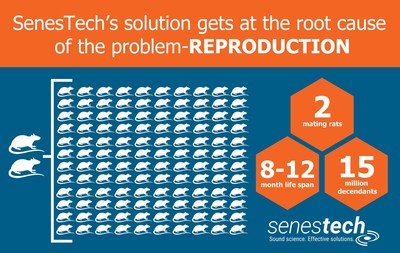SenesTech Looks to Reduce the Use of Dangerous and Harmful Rodenticide Treatments

Click Here is Learn More About our Innovative Technology
Click Here to Revolutionize Pest Control
Click Here to Watch a Video on ContraPest

Dr. Loretta Mayer, CEO of SenesTech
“ContraPest® has the ability to revolutionize how we control rodent pest populations in the United States by focusing on the root cause of the problem – reproduction,” commented Dr. Loretta Mayer, CEO of SenesTech. “Municipalities are perpetually faced with the constant harm caused by rodent overpopulation, including the transmission of diseases, damage to public infrastructure, as well as destruction and contamination of food supplies. ContraPest® is more humane, less harmful to the environment, and more effective in providing a sustainable solution to rodent pest infestations than traditional lethal methods, such as rodenticides, which contain lethal chemicals that can be toxic to humans and other animals.”
Dr. Mayer continued, “With this EPA approval, we look forward to working with local, state, and federal municipalities, as well as the private sector, to rapidly deploy our revolutionary technology, ContraPest®, helping to solve a rodent infestation epidemic which continues to go unresolved globally.”
ContraPest’s® novel technology and approach targets the reproductive capabilities of both sexes, inducing egg loss in female rodents and impairing sperm development in males. Using proprietary bait stations, ContraPest® is dispensed in a “rodent-friendly” liquid formulation that promotes the sustained take-up by rodent communities. ContraPest® is designed, formulated and dispensed to be safe for handlers and non-target species such as wildlife, livestock and pets, breaking down into inactive ingredients when it comes in contact with soil or water. In contrast, the historical approach to managing rodent pest populations, rodenticides, carries a high risk of environmental contamination and the poisoning of non-target animals, pets and children.
Current efforts to control rodent populations include the use of lethal chemical agents, also referred to as rodenticides, the sale of which constituted a $900 million market worldwide in 2013. Rodenticides, however, have a number of serious shortcomings:
- Rodenticides are not a long-term solution— the initial decline in rodent population exposed to rodenticides is typically followed by a ”population rebound” as the surviving rodents quickly reproduce, rodents from surrounding areas migrate in, and many rodent populations return to their original size within six to nine months.
- Rodenticides have an ineffective delivery method — due to their understanding of cause and effect, rodents will generally not consume food that they have seen adversely affect other rodents nor will they select poor-tasting rodenticides over other food sources.
- Rodenticides are unsafe — rodenticides contain lethal chemicals that can be toxic to humans and other animals, which has resulted in the EPA and similar authorities in other jurisdictions placing restrictions on the sale and use of rodenticides.
- Rodenticides are harmful to the environment— the poisons in rodenticides can accumulate in the bodies of rodents, transfer to other animals and contaminate the area where the rodent dies.
- Rodenticides are inhumane — lethal chemicals gradually culminate in the death of the rodent exposed to rodenticides over five to ten days, marked by extreme discomfort and pain.
Rodents destroy food reserves, act as vectors of disease, and damage infrastructure.
- Decreasing worldwide food supply— rodents destroy crops through consumption and contamination. Quality Assurance and Food Safety magazine estimated that in 2014, 20% of stored food was lost due to rodent activity.
- Damaging public infrastructure— rodents cause significant damage to public infrastructure, estimated by researchers at the National Wildlife Research Center in 2007 at over $27.0 billion in the U.S. alone on an annual basis.
- Transmitting disease — rodents transmit disease and deadly pathogens to humans and other species.
About SenesTech, Inc.
SenesTech has developed an innovative technology for managing animal pest populations through fertility control as opposed to a lethal approach. The Company’s first fertility control product candidate, ContraPest®, will be marketed for use initially in controlling rat infestations. We believe our non-lethal approach, targeting reproduction, is more humane, less harmful to the environment, and more effective in providing a sustainable solution to pest infestations than traditional lethal pest management methods. There is currently no fertility control product approved by the Food and Drug Administration (FDA), or the Environmental Protection Agency (EPA), for the management of rodent populations. We believe ContraPest® will establish a new paradigm in rodent control, resulting in improved performance in rodent control over rodenticides, without the negative environmental effects of rodenticides. For more information visit the SenesTech website at www.senestech.com.
